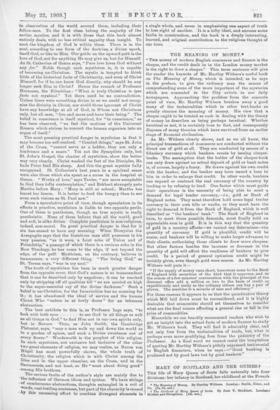THE MEANING OF MONEY.*
"THE money of modern English commerce and finance is the cheque, and the credit dealt in in the London money Market is the right to draw a cheque." This terse sentence will give the reader-the keynote of Mr. Hartley Withers's useful book on The Meaning of Money, which is intended, as he says in the preface, to give the 'ordinary man the means of
uomprehending some Of the more important of the mysteries which are concealed in the City article in our daily newspapers. Approaching the problem from the conerete point of view, Mr. Hartley Withers brushes away a good many of the technicalities which in other text-books so greatly obscure the meaning of money. His view that a cheque ought to be treated as cash in dealing with the theory of money lie describes as being perhaps heretical. Whether heretical or not, it is certainly true to fact, and consequently disposes of many theories which have survived from an earlier stage of financial civilisation.
As Mr, Withers clearly shows, and as we all know, the principal transactions of commerce are conducted without the direct use of gold at all. They are conducted by means of a fiduciary currency which bankers create by issuing cheque- books. The assumption that the holder of the cheque-book can only draw against an actual deposit of gold or bank-notes is, of course, largely a fancy. He draws against his own credit with the banker, and the banker may have issued a loan to him i in order to enlarge that credit. In other words, bankers can expand or Contract the real currency of the country by lending or by refusing to lend. One factor which must guide their operations is the necessity of being able to meet a demand for legal tender currency,—i.e„ gold or Bank of England notes. They must therefore hold some legal tender currency in their own tills or vaults, or they must have the right to demand it from the Bank of England, which is well described as "the bankers' bank." The Bank of England in turn, to meet these possible demands, must finally hold an appreciable sum in gold. It is in this way that the quantity of gold in a country affects—we cannot say determines—the quantity of currency. If gold is plentiful, credit will be easier, and bankers will be willing to make larger advances to their clients, authorising those clients to draw more cheques. But other factors besides the increase or decrease in the quantity of gold will affect the readiness • of bankers to give credit. In a period of general optimism credit might be lavishly given, even though gold were scarce. As Mr, Hartley Withers well puts it-
" If the supply of money runs short, borrowers come to the Bank of England with securities of the kind that it approves, and. in the course of a few minutes' conversation with the principal of the discount office add a million or two to the basis of credit, as expeditiously and easily as the ordinary citizen can buy a pair of gloves. The machine is a miracle of ease and efficiency."
For these reasons it appears to us that the quantitative tlieory which Mill laid down must be reconsidered, and it is highly desirable that economists should set themselves to consider what are the final causes affecting a general rise or fall in the
price of commodities. Meanwhile we can heartily recommend readers who wish Co
get an insight into the actual facts of modern finance to study Mr. Withers's book. They will find it admirably clear, and not only free from the technicalities of trade, but, what is perhaps even more gratifying, free from the pedantry of the Professor. As a final word we cannot resist the temptation' of quoting Mr. Hartley Withers's pithily expressed testimonial to English financiers, when he says :—" Good banking is produced not by good laws but by good bankers."










































 Previous page
Previous page